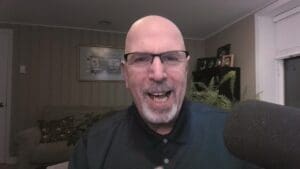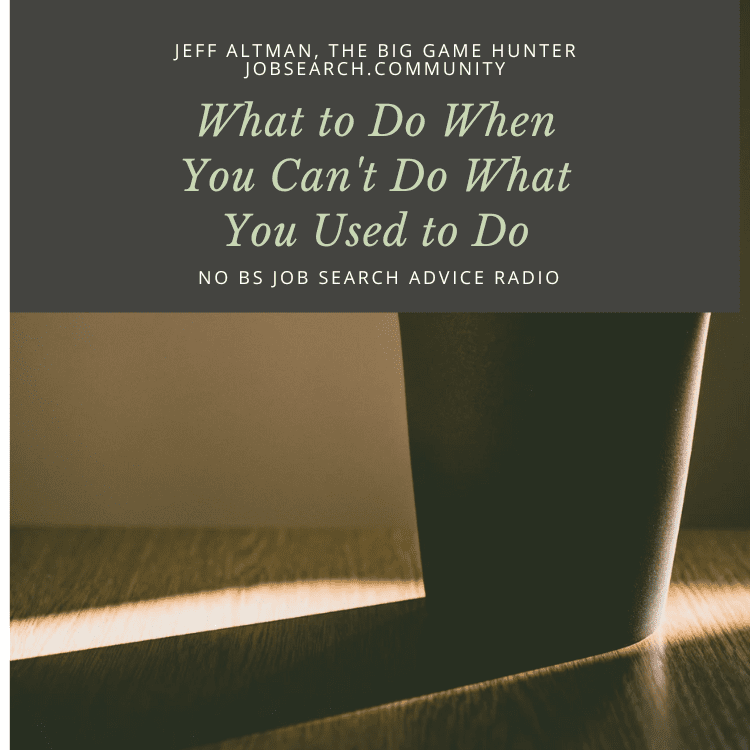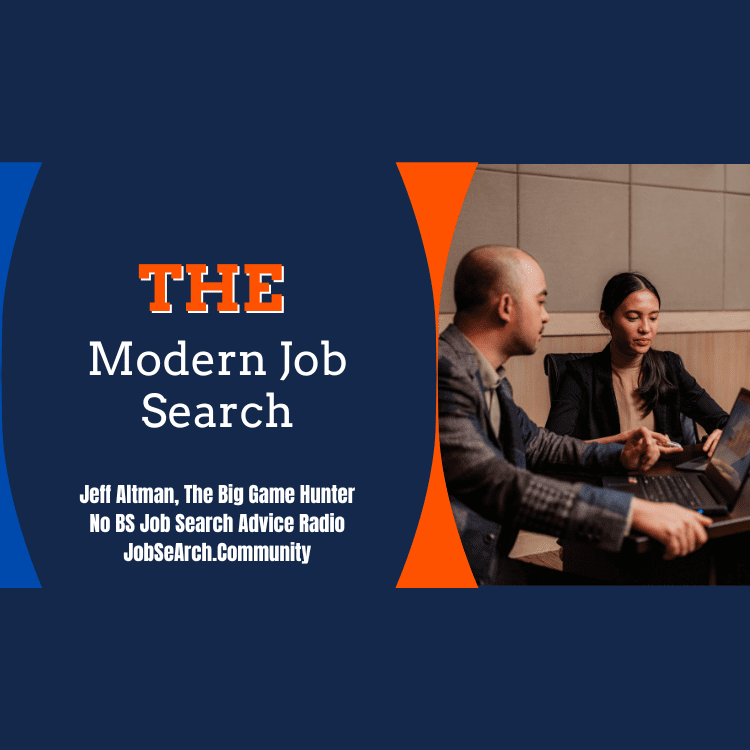By Jeff Altman, The Big Game Hunter
EP 3054 This deep dive is based on a presentation by David Schuchman where he explores the challenges individuals face when their former job skills and search methods are no longer effective in the current job market.
Effective LinkedIn Networking Strategies
Ever get that feeling? Like, well, you used to really work in your career. Just isn’t anymore. You feel a bit stuck.
Yeah. Happens to a lot of people. Well, you’re definitely not alone.
Today, we’re really going to dig into that. We’re looking at a presentation by David Shuchman. Right.
Shuchman. S-C-H-U-C–K-M-A-N. He’s got, what, 30 years in tech? Founded his own company? Exactly.
And he really got involved in the job seeker community after facing a couple of job losses himself. So he gets it. For sure.
And our mission today, really, is to get under the hood of why these career shifts feel so challenging when the old playbook fails, and more importantly, what you can actually do about it. We’re basing this all on his 2021 YouTube talk, What to Do When You Can’t Do What You Used to Do. David Shookman.
Got it. And his background really gives some credibility here, doesn’t it? Oh, absolutely. 30 years, corporate IT, Princeton Technology Advisors, his company, plus all his work with support groups.
Like the Professional Service Group of Mercer County, Breakfast Club of New Jersey. Career Support Group, New Jersey Job Seekers. The list goes on.
He’s hearing these stories firsthand every day. This isn’t theory. Right.
It’s grounded. Now, in his talk, he actually warned folks that the first part might sound a bit, well, depressing. He did.
Why is that? Because he focused first on the challenges, why the old ways aren’t working, but he argued you have to understand the problem before you can fix it. Makes sense. Okay, so let’s unpack that.
Why can’t someone just do what they used to do? What did he say? Well, several things. A big one is just not understanding today’s job market. It changes fast, and the pandemic really kicked that into high gear.
Yeah, things feel different now. Definitely, and sometimes it’s physical constraints, you know? Maybe a role becomes harder over time, or new certifications pop up that you suddenly need. The certification trap, even with years of experience.
Exactly, and outdated skills. That’s huge. It’s not just, like, super advanced tech, either.
Sometimes it’s basic office tools. He gave an example, didn’t he, about companies not updating. Yeah.
A company gets comfortable with older software, which is fine for them, but then long-term employees leave and find the market expects newer skills. Puts them at a disadvantage. That’s rough.
And what about job descriptions? Oh, yeah. He mentioned that disconnect. He was a hiring manager, and he admitted sometimes you just repost the old description.
It might not actually match what’s needed now. Wow. Okay, so individual skills, company practices.
What else? Bigger forces, too. Disruptive influences, the economy. Obviously, ups and downs change everything.
Right. Industry regulations. You know, sometimes these shift, depending on who’s in government, and we’re just reporting that, not taking sides, but those changes can really impact hiring.
Sure. New rules, new compliance needs. Exactly, and technology.
Always technology. Cloud computing, AI, they’re changing jobs everywhere. Even how companies hire has changed.
You mean the Applicant Tracking Systems? The ATS, yeah, or as he jokingly called them, Applicant Trashing Systems, because sometimes they filter out good people. Ouch. And the pandemic-specific impact.
He hit that hard. Industries like entertainment, travel, personal services, they were massively disrupted. And, of course, the huge shift to remote work changed the game for everyone.
So if all that’s happening, just sticking to your old job title or search methods, that might be the problem itself. That’s exactly his point. Maybe there just aren’t as many jobs for your exact old skill set, or your network is strong, but it’s in the old field, not where the new opportunities are.
So the recruiters aren’t calling back. Right, or you get an interview because your resume looks relevant on the surface, but then you can’t quite connect with what they need today. And that just tanks your morale, doesn’t it? Feeling stuck like that.
Totally. Which leads to his point about the cost of staying the course. It’s not just lost income.
It hits your personal time, your budget, your motivation. Can even strain family life. It’s a downward spiral.
It can be. He used that Y2K anecdote, remember? Oh, yeah, the COBOL programmer suddenly being in demand. Right.
A rare case where old skills became super valuable again. But he stressed that was an exception. Usually, skills age much faster now.
Okay, so that’s the tough part, understanding the challenges. But he didn’t leave it there, right? He pivoted. Exactly.
The second half was much more about solutions, about being optimistic but realistic. First, he said, okay, if you must do what you used to do, you have to change how you look. How so? Less online applying.
Definitely. Dial that way back. He said stats show maybe only 25 percent of jobs are filled that way.
Relying just on online boards and recruiters isn’t enough. So what’s the alternative? Networking? Bingo. But networking smartly, talking to people in your target industry.
Learn what’s really going on, how companies are hiring, what skills they actually value right now. Where do you find these people? Professional groups? Yes, professional associations are good. But he made a big point about meetup groups, meetup.com. Isn’t that more for hobbies or dating? He specifically said, no, it’s not just that.
It’s for any group with shared interests. The key, he said, is to join groups in your target industry, not just your profession. Ah, okay.
So if I’m a programmer wanting to get into finance, I join a finance meetup, not just a coding one. Exactly. That’s where you meet people in the industry you want to be in.
And it’s usually free to join meetup itself, though some local groups might have small fees. Interesting. What else for changing the search? Thinking about similar roles but in different industries, industries that are growing, your skills might be more transferable than you think.
Shifting sectors. Makes sense. And exploring different types of work, not just full-time, consulting, part-time, temp work.
Temp work can sometimes lead to full-time. Right. Maybe help with benefits.
It can, yeah. Or project work to build new skills, even starting your own business. But he cautioned, be patient.
These transitions take time. Okay, so changing how you search is key. But before that, he mentioned something about looking inward.
Absolutely critical. An honest self-assessment. That’s the starting point.
What does that involve? Like, really looking hard at your skills. Yes. Asking tough questions.
Has the way my job is done fundamentally changed? Do I have the current knowledge, the current tools? Are my industry regulations up to date in my head? How do you even figure that out? Talk to people in the field now. Do research. He even suggested reference librarians.
They’re great at finding info. Okay. And it’s not just about the technical stuff, right? Not at all.
He really emphasized identifying your transferable skills, your soft skills. The communication, teamwork. Problem solving, time management.
It’s about how you work, not just what tools you use. These skills are valuable, even if your specific software knowledge is a bit dated. So how do you get an objective view of those? He suggested asking former colleagues, managers, maybe even teachers if you’re a recent grad.
But he warned against relying only on friends and family. They might be too nice. Good point.
Need honest feedback. And then the big question. Do I even want to do what I used to do anymore? Ah, the Monty Python lumberjack moment.
Yeah. Maybe you secretly want a totally different career. Huh.
Maybe. He also mentioned professional assessments, personality tests, skills tests. They sometimes cost a bit, but they can uncover paths you hadn’t considered.
So let’s circle back to those soft skills. You really stressed those. He really did.
Because while hard skills, specific software tools can get outdated the way you work, your approach, your ability to learn, employers always need that. So you should highlight those more on your resume, especially of changing fields. Absolutely.
Show how you achieve results. He made the point that companies are often willing to train you on a specific tool if you have the right foundational soft skills. Those are harder to teach.
Okay. Self-assessment, understand your skills. Yeah.
What’s next in his framework? Facing reality. He brought up the Kubler-Ross stages of grief, denial, anger, bargaining, depression, acceptance. In relation to job loss.
Or just a really tough job search. His point was, you need to reach acceptance about your situation to really move forward effectively. You can’t stay stuck in denial or anger.
That’s powerful. It’s an emotional process, too. For sure.
And once you’re there, you can build your value proposition. Know what you offer the mix of hard and soft skills relevant now. And sometimes you might need help figuring that out.
Yeah. He mentioned seeking external help, career coaches, maybe life coaches if you’re exploring bigger changes, clarifying they aren’t therapists but focused on goals. And lean on your network for advice.
And keep your family in the loop. Definitely. Support system is key.
Okay. So we’ve got mindset, self-assessment, acceptance. Now for the practical steps.
What concrete actions did he recommend? Well, first, changing those job search methods we talked about. Less online spraying, more targeted networking. Develop a list of target companies.
And update your tools. Your resume. Big time.
He talked about a master resume versus targeted resumes. One big document with everything. Then you customize a specific version for each job application.
No more one-size-fits-all. And LinkedIn. How important is that? Crucial.
He sees it as almost an extension of your resume. Very important to keep it updated and active. Other social media.
Depends on your industry, he said. B2B versus B2C. Go where your audience is.
Makes sense. Research is key there. And then being open to different kinds of employment.
We touched on this part-time, consulting, temp, seasonal. Even different shifts. Yeah.
Or compressed work weeks. Yep. Second, third shift, on-call, job sharing, four-day weeks, remote work.
Be flexible about the structure of the job. And consider changing roles or industries entirely. Or maybe even job level.
Yes. Maybe a step back is needed initially to get into a new company or gain new experience setting you up for future growth. Or for some, starting a business or buying a franchise.
Lots of options. Wow, okay. That’s a lot to think about.
So for someone listening, what are the immediate next steps David Shuchman would suggest? First, investigate. Really research the current state of your target role and industry. If you’re client-facing, like his example, understand how consumer needs are changing.
Broaden your horizons. Exactly. Identify different roles, industries, maybe different job levels you might consider.
Don’t limit yourself too early. And skills. Keep learning.
Absolutely. Look into certifications if they’re relevant. And consider volunteering.
Volunteering. How does that help the job search? Builds new skills, expands your network, fills resume gaps. He pointed out, sadly, there can be bias against the unemployed even though it’s illegal.
And volunteer work framed professionally helps counter that. Shows you’re active. Good strategic move.
And again, explore consulting, maybe starting a business. Update that resume. Get active on LinkedIn.
He mentioned the algorithm likes activity. So even small updates boost your visibility. Did he share places to find more info or support? He did.
His own website, princetontechadvisors.com. The slides and eventually the video recording are in the workshops or recently offered programs section. And those support groups he’s involved with? Yes. The professional service group of Mercer County, psgofmercercounty.org. They meet Fridays at 10 a.m. Eastern
Links on their calendar. No registration needed. Different topic each week.
Really valuable. Any others? He mentioned the Breakfast Club of New Jersey, a career support group they meet Saturdays. Often have recruiters talking about LinkedIn and New Jersey job seekers.
Yeah. Plus a website called landingexpert.com lists groups in the tri-state area. And alumni associations.
Don’t forget those. Good call. They often have career services and great networking potential.
So wrapping this up, the key takeaway from David Shookman seems to be that when the old ways stop working, you need a multifaceted approach. Right. Understand the changes, look honestly at yourself, be open to new methods and new kinds of work, and actively build your network.
It’s about adapting. A really practical deep dive based on David Shookman’s experience. That’s S. Etchikman.
Definitely gave us a lot of actionable advice drawn from real life. So here’s something to think about as we finish. What’s one small doable step you can take today based on all this? Maybe it’s just spending 15 minutes updating your LinkedIn headline.
Or searching Meetup for one group in an industry that interests you. Or drafting an email to one former colleague just to reconnect. What’s your most manageable first step to start shifting things?
Job Hunting and The 10,000 Rule.
ABOUT JEFF ALTMAN, THE BIG GAME HUNTER
People hire Jeff Altman, The Big Game Hunter to provide No BS Career Advice globally because he makes many things in peoples’ careers easier. Those things can involve job search, hiring more effectively, managing and leading better, career transition, as well as advice about resolving workplace issues.
involve job search, hiring more effectively, managing and leading better, career transition, as well as advice about resolving workplace issues.
The Final Interview With The Company President
You will find great info to help with your job search at my new site, JobSearch.Community Besides the video courses, books and guides, I answer questions from members daily about their job search. Leave job search questions and I will respond daily. Become an Insider+ member and you get everything you’d get as an Insider PLUS you can get me on Zoom calls to get questions answered. Become an Insider Premium member and we do individual and group coaching.
Seven Steps To Branding Yourself As An Expert
Schedule a discovery call to speak with me about coaching you during your job search at www.TheBigGameHunter.us to discuss one-on-one or group coaching with me
LinkedIn: https://www.linkedin.com/in/TheBigGameHunter
.A Marketing Approach to Job Search
We grant permission for this post and others to be used on your website as long as a backlink is included to www.TheBigGameHunter.us and notice is provided that it is provided by Jeff Altman, The Big Game Hunter as an author or creator. Not acknowledging his work or providing a backlink to www.TheBigGameHunter.us makes you subject to a $1000 penalty which you proactively agree to pay.









